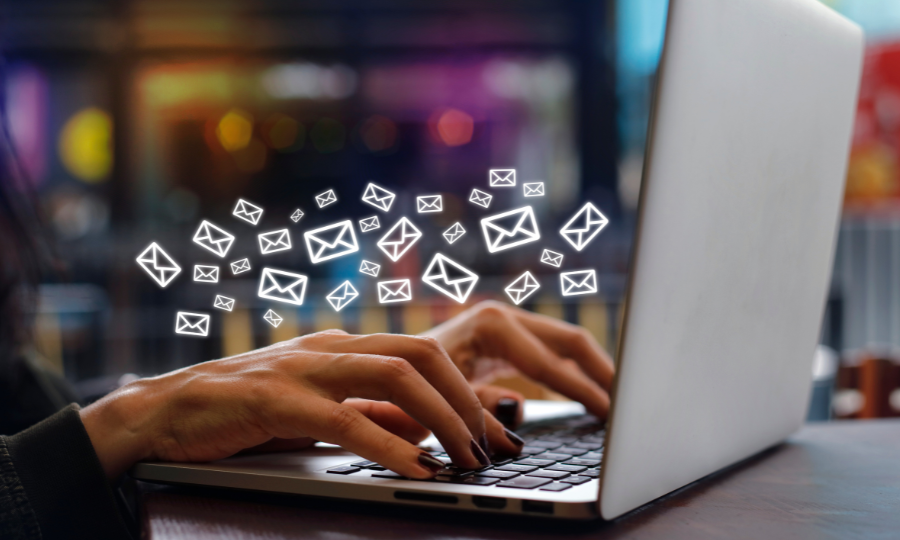
After an intense preparation process and a successful event, the event organizers breathe a sigh of relief and focus on their next event. In that period, when the intensive working routine restarts, the previous successful event is not talked about much and marketing activities are suddenly cut off. This is a big mistake some event organizers make. Communication and marketing must continue non-stop for long-term relationship building and boosted ROI.
Sending a post-event thank you email is a great way to pursue communication, show your appreciation for your guests and build relationships with potential customers.
But what should you include in your thank you email to make it effective?
In this article, we'll provide tips on how to personalize your thank you email, express your gratitude, and include a call to action. By following these tips, you can ensure that your post-event thank you email makes a lasting impression and keeps the audience in the loop.
When writing a post-event thank you email, it is important to include certain elements to make it effective.
Email should be personalized: This means addressing the recipient by name and referencing something specific about the event that they attended.
Express your gratitude for their attendance: Thank them for their time and effort in coming to the event.
Include some highlights: Tell the recipient about the highlights, memorable moments plus statistics of the event. This could be a moment of a celebrity speaker or a number of attendees at the venue.
Some points should and should not be in the content for the thank you email to reach its purpose. Considering that there may be people who receive hundreds of emails every day, it is important to keep the content as clear and relevant as possible. Here are some tips to keep your email clear and relevant.
When writing a thank you email after an event, the subject line of the email should be direct and clear. This will help the recipient understand the purpose of the email and ensure that they don't overlook it or mistake it for spam.
For example, you could use a subject line like "Thank You for Attending [Event Name] on [Date]" or "Appreciation for Your Participation in [Event Name]".
Overall, it's important to choose a subject line that accurately reflects the content of the email and shows your gratitude in a professional and clear manner.
Selecting a professional opening statement is important when writing a thank you email after an event. The opening statement sets the tone for the rest of the email and can make a positive first impression on the recipient.
Here are some examples of professional opening statements you could use:
Remember to keep your opening statement brief and to the point while still conveying your appreciation. This will help ensure that your message is well-received and that the recipient is motivated to read on.
Expressing gratitude is the main purpose of a thank you email after an event, so it's important to do so in a clear and genuine way.
Here are some tips for expressing gratitude effectively in your email:
Be specific: Mention what you appreciated about the recipient's attendance or contribution to the event. For example, you could thank them for their insightful questions during a Q&A session, their generous donation to a fundraiser, or their enthusiasm in participating in a group activity.
Use a positive tone: Use language that conveys a positive and appreciative tone. You can say "I was thrilled to see you at the event" instead of "I'm glad you managed to make it."
Be genuine: Express your gratitude in a sincere and authentic way. If you are genuinely grateful, this should come across naturally in your email.
Here's an example of a sentence that expresses gratitude effectively: "Your presence at the event helped make it a huge success, and we're so grateful for your support."
Remember, expressing gratitude is a key part of a thank you email, so take the time to do it well and make sure the recipient feels valued and appreciated.
Including highlights and statistics from the event can be a great way to reinforce the impact of the event and to show the recipient the positive outcomes that resulted from their attendance or contribution.
If you have any statistics or metrics that demonstrate the success of the event, such as the number of attendees, funds raised, or positive feedback received, you can include those in your email. Additionally, you can mention any specific highlights or memorable moments from the event that you think the recipient would appreciate.
Here's an example of a sentence that includes both highlights and statistics: "Thanks to your generous donation, we were able to raise over $10,000 for the charity, and the keynote speaker you recommended received rave reviews from attendees for their inspiring message."
By including highlights and statistics, you can reinforce the positive impact of the event and show the recipient that their participation or contribution made a tangible difference.
Just make sure to keep the focus on expressing gratitude and appreciation, rather than simply providing a report of the event's metrics.
It's generally fine to mention other upcoming events in your thank you email, but you should do so carefully and tactfully so that it doesn't come across as too pushy or salesy.
If you have other events coming up that you think the recipient would be interested in, you can briefly mention them towards the end of your email. For example, you could say something like "We have a number of exciting events coming up in the next few months, including a fundraising gala and a charity run. I'd be happy to provide more details if you're interested."
However, be sure to keep the focus of your email on expressing gratitude for the recipient's attendance or contribution to the recent event. Mentioning other events should be secondary to that main goal. Additionally, ensure you're not bombarding the recipient with too much information or making them feel obligated to attend future events.
Overall, mentioning other upcoming events can be a good way to keep the recipient engaged and connected with your organization, but make sure to do so in a way that is respectful of their time and interests.
It's generally not necessary to include a CTA (Call to Action) in a thank you email after an event. The primary goal of the email is to express gratitude for the recipient's attendance or contribution, not to promote a product or service.
However, if you do decide to include a CTA, it should be relevant to the recipient and focused on providing value to them. For example, if you're hosting a series of webinars that you think the recipient would be interested in, you could include a CTA like "Learn More About Our Upcoming Webinars."
However, make sure that the CTA is not too pushy or aggressive and that it doesn't detract from the main purpose of the email, which is to thank the recipient.
In general, a thank you email after an event should be focused on expressing gratitude and building a positive relationship with the recipient. It's better to promote your product in a separate email or through other marketing channels.
By following these simple tips, you can create an impressive post-event thank you email that will leave a lasting impression on your guests.
When writing a post-event thank you email, it's important to be mindful of the tone and content of your message. Here are a few things to avoid:
Subject Line: Thank You for Attending [Event Name] on [Date]
Hi Joe,
It was wonderful to have you join us at [Event Name] last [Date], and I wanted to personally thank you for your participation.
We were about 700 industry professionals representing 100 companies in 30 countries.
Thanks to your generous donation, we were able to raise over $250,000 for the charity, and the keynote speaker you recommended received rave reviews from attendees for their inspiring message.
We have a number of exciting events coming up in the next few months, including a fundraising gala and a charity run. Here is the link: link to website
Let me know if you need anything from me and ABC Events.
All the best,
Subject Line: Appreciation for Your Participation in [Event Name]
Hi Mr. Smith,
Thank you for taking the time to attend [Event Name] and for your continued support of [Company/Organization Name].
Your presence at the event helped make it a huge success, and we're so grateful for your support. We were able to match 120 startups with 30 investors and create business opportunities for all parties.
We have two speed investment events coming up in the next few months, including a conference. I'd be happy to provide more details if you're interested.
Here is the link: link to website
Let me know if you need further information.
Best regards,
Overall, the key to writing a successful post-event thank you email is to focus on expressing genuine appreciation and building a positive relationship with the recipient. If you follow the steps, be unique and avoid common pitfalls, you'll be able to craft an effective and well-received thank you email.
March 23, 2023

About me:
After seven years of translation experience in the management-related field and a passion for digital marketing, I was given the opportunity to work with the Cloud Markethink Agency and CloudTalk Global, the largest cloud computing event in Eurasia, as a team member to manage business events.
Additionally, working with Deal Room Events has provided me with a wonderful opportunity to reflect on and expand my experience as a content event marketing professional.
Our friendly and experienced team is ready to help.
